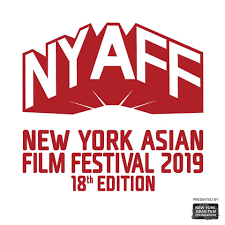New York Asian Film Festival – a BAZILLION reviews by Michael O’Keefe, host of Mystic & Severe (alternating Thursdays, midnight to 2AM)
Covering #NYAFF2019 has truly been a privilege and while I’ve reviewed plenty of films over the radio this has proven to be a very fun exercise that ate up the majority of my spare time for 2 weeks out of choice. Trying to understand any culture that is different is challenging but the medium of film is certainly the strongest medium to do just because of the power on the senses that watching a movie provides can lead to empathy. These 40 different film scenarios that have been reviewed all have their strengths while they are not all great there were plenty of gems to be found in here and if there was a negative review that still captured your interest then that’s fantastic. Enjoy the last batch of reviews and remember it has been a true pleasure for me to let you know about these films! …..
If you find yourself in New York during June 28th to July 14th you should check out the New York Asian Film Festival at the legendary Lincoln Centre! There you could see all the finest films from Tibet, Taiwan, China, Hong Kong, Singapore, Philippines, South Korea, Vietnam & Japan. If you’re a little tired of Hollywood Blockbusters & would like to be entertained outside the system you cannot go wrong with contemporary Asian cinema. Check in every Friday to read about these fine films!
Ottawa would be very fortunate if the ByTowne Cinema or Mayfair Theatre book films from the New York Asian Film Festival because of the diversity of the work. Tibetan and Taiwanese mysticism, odd Japanese humor, historical oppression, horror and action can be found in the films being reviewed here. As the festival begins we should remember it’s not about being Asian or wanting to be respectful of a different culture it is really about the quality of the work as a reason to watch these films!
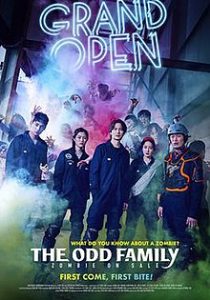 The Odd Family: Zombie on Sale: This is the ultimate Zom-Com of the festival. Not to knock ‘Zombiepura,’ but this is just set the bar higher for Asian Zom-Com’s it may be the best one yet and obviously is comes from South Korea a country who is now producing one of the greatest production systems out of Hollywood. This is a film that looks at family and what one does when an old relative gets a little funny – we’ve all been there & the lengths we’d go to protect that family member basically doesn’t differ. The visuals are really strong in the film the camera buzzes around at appropriate time and they make the movie have a lot of flare which is totally appropriate for a Zom-Com in fact this movie has pulse throughout its duration. To expect effects like ‘The Walking Dead,’ is unfair & arguably the effects in this film are better because they’ve got more heart and soul in them instead of being as slick or as high budget as possible. There also isn’t all that much gore and it is the family element that makes this film the best Asian Zom-Com ever!
The Odd Family: Zombie on Sale: This is the ultimate Zom-Com of the festival. Not to knock ‘Zombiepura,’ but this is just set the bar higher for Asian Zom-Com’s it may be the best one yet and obviously is comes from South Korea a country who is now producing one of the greatest production systems out of Hollywood. This is a film that looks at family and what one does when an old relative gets a little funny – we’ve all been there & the lengths we’d go to protect that family member basically doesn’t differ. The visuals are really strong in the film the camera buzzes around at appropriate time and they make the movie have a lot of flare which is totally appropriate for a Zom-Com in fact this movie has pulse throughout its duration. To expect effects like ‘The Walking Dead,’ is unfair & arguably the effects in this film are better because they’ve got more heart and soul in them instead of being as slick or as high budget as possible. There also isn’t all that much gore and it is the family element that makes this film the best Asian Zom-Com ever!
Lying to Mom: Japan has some incredibly repressed individuals but because of that some of the most expressive but it comes out in art they do not feel differently than other cultures and that is evident in ‘Lying to Mom.’ The subject matter is incredibly dark so it will clear not be for everyone it is about covering up suicide for the Mom in the title of the movie and how a family is effected by this total trauma. Suicide seems to go against human instinct which is usually to survive and the pain that it inflicts on love ones knows no end so if we don’t learn how to communicate with the mentally ill we simply will keep seeing this act performed. It is not right to judge those who commit this act as will never know the extent of their suffering and this film becomes beautiful in its completely depressing subject it is more transcendental information than entertainment. There is levity but it is in a dark way but if you have had someone commit suicide in your life or someone you think is capable of doing it this movie might be a huge release for you to see your life in a Japanese movie scenario is satisfying but not entertainment. The medium of cinema is believed to entertain but at times it can do something else which helps us connect with each other to see what it is to be human in sometimes an extreme way but that should be deemed okay. The film is heavy from start to finish but from a writing perspective it flows quite well and we really get to explore the experience of grief which is something that can’t be simply gotten over or snapped out of: we stay with it for over 2 hours but know others face it much more than that in their lives. While this is not an easy watch it is very good and will appeal to some people.
 A First Farewell: You may not know anything about the Uighur but after this movie you will get a solid impression of their unfortunately sad lives so this movie does a solid job depressing the viewer without going into grief porn territory. Getting a sense of a different culture’s lifestyle is not the only thing foreign films can do but getting that done well usually plays well for Western audiences but it is not necessarily bait-y as well it can be really dramatically satisfying. While this film may not be incredibly the quiet empathy and somewhat documentary style examining the lives of primarily Uighur children who do poorly in school but are generally not appreciated within China. Muslims in China and Burma are discriminated against as they do in North America in Europe but it’s still important to see what it’s like in Asia and this film does that by showing how the marginalization is done. The problem may be that children actors have a hard time performing since they lack emotional and intellectual maturity so they rarely show subtlety but they are very cute so it’s hard not to root for any child. The acting works to an extent in the same sense that the story does: it is unorthodox but gives you a sense of a specific story of oppression which may not be enough for you but as far as the rules are set up it is pretty well done.
A First Farewell: You may not know anything about the Uighur but after this movie you will get a solid impression of their unfortunately sad lives so this movie does a solid job depressing the viewer without going into grief porn territory. Getting a sense of a different culture’s lifestyle is not the only thing foreign films can do but getting that done well usually plays well for Western audiences but it is not necessarily bait-y as well it can be really dramatically satisfying. While this film may not be incredibly the quiet empathy and somewhat documentary style examining the lives of primarily Uighur children who do poorly in school but are generally not appreciated within China. Muslims in China and Burma are discriminated against as they do in North America in Europe but it’s still important to see what it’s like in Asia and this film does that by showing how the marginalization is done. The problem may be that children actors have a hard time performing since they lack emotional and intellectual maturity so they rarely show subtlety but they are very cute so it’s hard not to root for any child. The acting works to an extent in the same sense that the story does: it is unorthodox but gives you a sense of a specific story of oppression which may not be enough for you but as far as the rules are set up it is pretty well done.
5 Million Dollar Life: How could anyone else make a comedy about suicide than the Japanese? This road movie about a young man named Mirai Takatsuki trying to go out into the world prematurely to make money to pay for his unfortunate medical expenses to then kill himself is very charming in a perverse way. But is it actually perverse if it’s cultural? What is interesting about this film is that has fun with dark subject matter without having an absurdist nihilist tone or sugar high comedic pitch it is more just a strong but not untypical film from Japan. The characters Mirai Takatsuki all think he’s crazy but then again they all are a little off and are charmed by him so it is all mostly pleasantness in this unique experience that should give some cultural insight and hopefully will charm you. Perhaps this is too taboo for you to laugh at but film can be a healthy way to explore this kind of material in fact it can be kind of a relief to watch a story so screwed up without any personal consequences. The journey is what this film is all about and although it explores incredibly messed up emotional territory, if you make it to the ending of the film you won’t hate the world that allowed this film to be made you will most likely be relieved.
Another Child: The story about two young girls discovering that their mothers share a male lover is low on mood and high on structure and that is meant as a compliment the writing makes this story flow just as well as a formulaic Hollywood one. It is psychologically strong as well showing the process stemming from this betrayal it goes from pain, anger, acceptance, being overwhelmed then acceptance in a very sophisticated way which is further proof of the strength of the South Korean film industry. Everyone has a character voice in this and is sympathetic even the cheating father to an extent though he is vilified he is entitled so we can at least understand where he is coming from despite not approving of his adultery. If you are into drama this has got it and there is plenty of lightness for that nice balance so while the story is a serious one it is not grief porn or wallowing in melodramatic despair it shows a journey that is strong. ‘Another Child,’ is certainly one of the better films playing at the festival which should make you want to see it especially at the ByTowne Cinema this is proof that foreign serious dramas are not exclusive to Europe.
The Crossing: This Chinese coming of age drama looks at criminal smuggling of I Phones from just outside of Hong Kong to mainland China by a 16 year old girl in a pretty not too compelling story. Peipei is the name of the 16 year old female protagonist and while it is not unheard of that respectable people do terrible things her draw and seduction into the gang seems implausible since the gangsters are unlikeable and obnoxious. Peipei is a pretty girl, why did she seemingly randomly fall in with this group? She’s committing these crimes for her trip to Japan with her friends but it still seems like a flimsy motivation and not very captivating stakes for this movie. There is little felt pressure in this film it goes through the rise and fall in the criminal road trope and circa the 1932 ‘Scarface,’ gives the Government Public Service Announcement saying that the Government will get you if you break the law. Certainly it seems a little strange that Chinese censors would have to remind their citizens of this however you probably just shouldn’t watch this movie if the opportunity arises because it is rather lifeless.
Uncle and House: This film is quite interesting as it looks one particular criminal who is from a well off background as well as internationally educated who decides to work within a gang who works in counterfeiting money. The movie looks at 100 Yuan Bill travel around a Chinese town from the young to the old and how the people are all connected in this somewhat genuine close knit community but are distant from each other because of greed. The impact of this affluent gangster using his privilege to then be a bad example in a small community is pretty provocative as we see the children discuss him in fully aware ways while being totally perplexed. As are the gangsters but it is the idea of searching for something real, innovative and visionary through the criminal world which is not intellectual but is certainly gritty and real so of course they are counterfeiting reality to an extent. There have been movies to use the counterfeit money scheme as a metaphor such as personal relationships in L.A. in the film ‘To Live and Die in L.A.,’ as well as identity in the recent Chow Yun-Fat movie ‘Project Gutenberg.’ This movie is a bit grittier though despite feeling like a movie it is not as glossy as the previously mentioned films and the idea of someone leaving behind their affluence to strive for something real despite being confused is quite interesting.
Maggie: Sinkholes and fishes are images used memorably in ‘Maggie,’ a very interesting absurdist comedy from South Korea which looks at a couple who get caught in the moment in an x ray at a hospital. The idea of life as a randomly destructive sinkhole and we are the mindless fish waiting to fall into is surreally intense but it really is a funny movie more than a fatal surrealist film so it shouldn’t scare you away if you don’t like or know about Alejandro Jodorowsky. Instead the film is a pleasant romp into surrealism looking at different personalities in relationship clashing: she’s got a job and he’s spunky. It is apparent that it becomes a debate of rationalism versus irrationalism in the end and the best way to embody that debate is through the metaphor of the relationship which makes for an interesting film especially in the first and third act. Doing surrealism well is difficult though and the film does kind of lie there in a way that could’ve been improved in the writing phase of the film but it is always fun to see this style of film and some of the images are really strong.
Someone in the Clouds: This bizarre Taiwanese rom com’s angle is that of astrology which should be viewed as fun mumbo jumbo unless taken seriously it is harmful or a waste of time which it usually is not. Astrology is usually harmless fun so making a romantic comedy instead of some violent fantasy movie through this point of view makes sense because people go to astrologists to delude themselves about their sex life and career. Every culture has their own historical approach with astrology so to see the current Taiwanese angle is pretty cool but in the end this film becomes a somewhat typical and insufferable sugar high comedy. The clairvoyants are pretty cool though so is the weird low budget super natural scenes which look awful but are charming in what is properly an intentional way however it is the hammy acting that it unbearable. The trope of hate each other, love each other, hate each other then finally love each other gets pretty annoying in rom coms and this film doesn’t enhance that obnoxious quality with the mentioned sugar high tone. If you like rom coms from Hollywood you might like Asian rom coms but like Hollywood ones they aren’t universally bad but they are mostly bad so keep all that in mind and try not to pass out from the sugar high.
Still Human: This movie is typical in an emotional story sense but has a feeling of being genuine as it looks at a cantankerous old Chinese man and his young female Pilipino caretaker as they learn to appreciate one another. The notion of love is one that isn’t for material gain but simply to appreciate someone else which might be a basic message but an important one nevertheless when we seek love from a partner. It starts crotchety then develops into a pleasant story about redemption, friendship, connection and appreciating your friend for who they are instead of what you want to project or falsely expect from another person. If this type of heart-warming film is your cup of tea you’ll already be on board but if it is not an automatic go to then reconsider this particular film because it really does stand out amongst other kinds of films like this. The dirty apartment does not simply come across as exotic but one gest a sense of life lived instead of something emotionally implausible the story does seem genuine in its sweetness and the direct emotion is not conceited or cynical it is all for real in a movie sense.
Iron Monkey: This film is from 1993 and was part of the ‘Quentin Tarantino Presents,’ series that some foreign or independent films got from the 1990s to the 2000s during Harvey Weinstein’s Miramax days. It played on 35mm at the New York Asian Film Festival with director Yuen-Woo Ping in attendance and what a treat that was for the audience however here we can always watch it on home video and still appreciate it. It stars Donnie Yen of ‘Rogue One,’ fame and while it is a very run of the mill wuxia production in the writing it is all about the Yuen-Woo Ping choreographed action which remains to this day an incredibly fun experience especially the pole and pit of fire fight in the end. It tells the Robin Hood story of righteous vigilantes taking on the corrupt and greedy government which may not be anything new but everything in the fights is BIG & FUN leaving no room for subtlety but plenty of time for laughs. This may not be as innovative as Yuen-Woo Ping’s work with Jackie Chan or as inspired as his work for Jet Li but Donnie Yen has finally gotten some Western recognition with the Ip Man movies as well as ‘Rogue One,’ and this film will deliver the goods for you. Granted if you have no interest in period Kung-Fu movies this will change nothing for you but if you’re looking for a good time with awesome fights and like that ridiculous dubbing to be found in these films you are certainly in for a good time.
Winter After Winter: Manchurians occupied by the Japanese in 1944 is the setting for this film but it is the filmmaking approach which is most interesting it is shot in black and white and has plenty of long shots with no cuts. It is the lighting with black and white with strong contrasts that allow the emotion to set in though not the long shots because cutting typically is more effective in movies despite there being loads of cool twists and turns of the camera to be seen in the movie. It is a little relentless in the depressing tone which is inevitable for this story but when it comes to ‘A Resistance,’ which also plays at the New York Asian Film Festival and has been reviewed on ckcufm.com it remains a stronger film. Masaki Kobayashi’s incredibly long trilogy ‘The Human Condition,’ also falls into the same category of ‘A Resistance,’ & ‘Winter After Winter,’ which is more of a boring history lesson than well done cinema instead of an inventive scenario which shines light on history. If there is a well done Asian film about real life imprisonment in the 20th century this reviewer hasn’t seen it while there are certainly ones better than others perhaps the next filmmaker who takes on this sub-genre will be a little bit more inventive and less preachy. The history remains important but the storytelling also remains the same and it is pretty stale.
Fatal Raid: ‘Fatal Raid,’ may not be classic Hong Kong action by John Woo standards but that’s totally fine! It is more a middle road high octane experience meaning that it is sexy and flashy it is overwhelms the senses while also being disposable entertainment! This is a movie to watch with friends over some pretzels and beer or to watch for yourself if you’re in the need of some fun escapism. The plot is interchangeable: some cops lose to the anarchist gangsters then the surviving cop gets a team 20 years later to equal the score. While this isn’t going to get win the Oscar for Most Original Movie the actors are beautiful and the action is inspired enough and is essentially non-stop from the first to last frame. As for the women I’m betting they were cast a lot for their looks but they also have more to do than just be objects for lust they are the ones we identify with as they unravel and make sense of the anarchist plot.
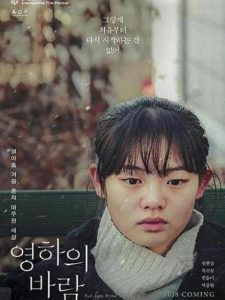 Sub-Zero Wind: While there are no acts of physical violence and barely any raised voices in this film it does get incredibly emotionally draining by the end of the film by the sheer difficulty of making something of yourself in contemporary times. South Korea is no different apparently and this raising a family drama at every turn consistently goes down beat which makes it somewhat hard to appreciate since no one really displays the charisma to justify this. Perhaps that is just the Hollywood effect after a certain amount of time one expects everyone to either beautiful, charming or a combination of both but this has a pessimism found in social realist dramas of another time. The story of the young lady Young-ha & her cousin Mi-jin is a constant seeking of stability within an unstable world that the adult characters are able to give then the young girls inherit nothing but suffering. This film is pretty good but lacks any escapist appeal or much relief which zaps the energy it is presumably trying to get but regardless the directorial debut of Kim Yu-ri is strong and it is a career to follow in the upcoming years!
Sub-Zero Wind: While there are no acts of physical violence and barely any raised voices in this film it does get incredibly emotionally draining by the end of the film by the sheer difficulty of making something of yourself in contemporary times. South Korea is no different apparently and this raising a family drama at every turn consistently goes down beat which makes it somewhat hard to appreciate since no one really displays the charisma to justify this. Perhaps that is just the Hollywood effect after a certain amount of time one expects everyone to either beautiful, charming or a combination of both but this has a pessimism found in social realist dramas of another time. The story of the young lady Young-ha & her cousin Mi-jin is a constant seeking of stability within an unstable world that the adult characters are able to give then the young girls inherit nothing but suffering. This film is pretty good but lacks any escapist appeal or much relief which zaps the energy it is presumably trying to get but regardless the directorial debut of Kim Yu-ri is strong and it is a career to follow in the upcoming years!
Move the Grave: Road trips with family members can be hard as is a death in a family so when you combine both you have a movie which is funny, obnoxious, emotional, and ambitious making the end product a notch above middle of the road. The family members are all dysfunctional in their own different way however it is a stretch to say they all have unique character voices they kind of drown each other out at points but all seem equally angry. There is no leader in the chaos no one to see the forest through the trees on a consistent basis but the film does have some larger than life moments for a road movie which is a genre which inherently has its own challenges. The biggest problem in this genre is not all that much happens sometimes which is the case with this one the story doesn’t really evolve it’s just a journey to a destination with some good moments then it’s over. That being said the chubby characters are fun and this movie speaks to all the troubled family which is every family at the end of the day so there is a certain sweetness that is presented in the chaos of this film.
Dark Figure of Crime: This police procedural is unfortunately as generic as its title which leaves nothing to suggestion it merely presents a scenario of a wider scheme to reveal that there is just a horrific guy who did horrific thing. The twists and turns are nothing that would be seen in an Alfred Hitchcock film or read in an Agatha Christie book it is within a cool genre but adds nothing to it other than just existing which is a total waste. Before he made ‘Shoplifters,’ Hirkoazu Koreeda made the excellent film called ‘The Third Murder,’ and in South Korea there was ‘Memories of Murders,’ back in 2003 so for those who want to see an Asian police procedural they are much better off with those two films. The cop and robber have exchanges with each other the cop investigates and then they go back to the same thing until the movie is over which does not make for a very inspired scenario. The exchanges are not all that great by the end although they do start off to be a little freaky in the beginning but this true story South Korean police procedural just never finds a way to distinguish itself from already very good or great films in the genre. Too bad!
White Snake: It is hard to imagine a movie for kids about a young man turning himself and his dog into a shape shifting demon to get on the good side of a female shape shifting demon getting produced in Hollywood. It might be totally justified that that is the case however the animated Wuxia ‘White Dragon,’ is to the Chinese solution to that issue which is kind of wonderful but surreal experience. The film becomes especially difficult to follow its Taoist mythology that few Non-Chinese will know about and the use of it seems to suggest that there is a Demonic hierarchy and mortals but no Divine figure that is moral. The buddy dog even gets to talk in this movie which can only be seen to be believed and since he mainly is in the background he kind of becomes like Samuel L. Jackson schizophrenic projection of himself in ‘Afro Samurai.’ The animation isn’t on Pixar’s level but that should not be a deal breaker it might just be what kind of message you’d want to send to your kids however it is an interesting history level of sorts and certainly very trippy.
Signal Rock: This Pilipino movie has a very interesting subject matter which is what happens to communities when the women marry foreigners to get out of their unfortunate economic circumstances? Plenty of Canadian men of different nationalities have Pilipino wives and to see a movie that take the perspective of the families and friends who lose a woman close to them because of this is totally worth a movie. The answer as to what happens to them is that they suffer and are humiliated and they have to live with this reality simply because of where they were born instead of being competent or incompetent people. Some of the scenes are heartbreaking but gratitude seems to be around the corner for the protagonist Intoy despite it never actually coming towards him and the last few scenes are frankly humiliating to watch. The movie does get a little one noted and it may have been nice for it be structured a little bit better however it is a sociological film one that has a question without any answer or at least a quick answer. The fact seems to be you can be great lover but without financial support your love will grow stale quick in this world we live in and economic improvement can be generational so in your life time you could be totally out of luck in this regard. Ouch.
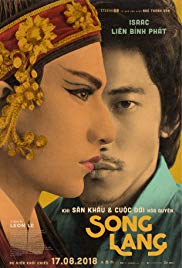 Song Lang: Director Leon Lê has accomplished much with his debut feature film which tells the story of a gangster named Thunderbolt who extorts people for a living but like any human being can be touched and moved. In Nazi Occupied Poland some Jewish artists were treated differently because of their ability to move Nazi soldiers because virtually all of us can appreciate beauty and people who lead horrific lives are no different. To see this story told in a story set in Vietnam during the 1980s was truly a treat and it is the Cai-luong folk opera that moves Thunderbolt to friendship with Linh Phung who does this opera creating a seemingly bizarre yet understandable kinship. The photography, lights and setting are simply hypnotic making it impossible to not be entranced by this material if you engage with it in fact it is shot so well that members of the crew should be incorporated into Hollywood. The film speaks to our desire to be better than something than what we currently are and that art has the ability to help realize our aspirations of who we want to be so that we can live our best life despite past transgressions. It is emotionally fluid in the script and everything flows both naturally so it is not some loose concept it is all on display on the screen through the beautiful acting and of course much of the credit lies with the wonderful crew.
Song Lang: Director Leon Lê has accomplished much with his debut feature film which tells the story of a gangster named Thunderbolt who extorts people for a living but like any human being can be touched and moved. In Nazi Occupied Poland some Jewish artists were treated differently because of their ability to move Nazi soldiers because virtually all of us can appreciate beauty and people who lead horrific lives are no different. To see this story told in a story set in Vietnam during the 1980s was truly a treat and it is the Cai-luong folk opera that moves Thunderbolt to friendship with Linh Phung who does this opera creating a seemingly bizarre yet understandable kinship. The photography, lights and setting are simply hypnotic making it impossible to not be entranced by this material if you engage with it in fact it is shot so well that members of the crew should be incorporated into Hollywood. The film speaks to our desire to be better than something than what we currently are and that art has the ability to help realize our aspirations of who we want to be so that we can live our best life despite past transgressions. It is emotionally fluid in the script and everything flows both naturally so it is not some loose concept it is all on display on the screen through the beautiful acting and of course much of the credit lies with the wonderful crew.
Ma: More proof that the Filipino Film Industry is back on the rise with ‘Ma,’ a creepy premise of kids committing murder for a spirit for no real end which makes you wonder when people will stop trusting spirits. The spirit promises the kids that if they kill specific people and let this demonic shrubbery suck their energy that they’ll have their mother back and perhaps we should give the kids a pass since they’re too young to have seen this type of movie before. The film is well shot and the kids act well or at least seem sincere in their performances and the music is really solid which is integral to the success of the atmosphere in any horror movie whether it is bold or spare. The thing that makes the film a little lame is the demonic shrubbery which really looks bad despite the voice actor being creepy and fun the fact is it does minimize the element of fear becoming unintentionally funny. The premise is well written with strong understanding of this material, the actors all add something to this creepy flick but my favorite thing has to be the score since it does create a strong sense of ambience which is integral to horror.
Jam: American Indie Director Jim Jarmusch once said that the other art form that film most resembles is music since both mediums exist in time and ‘Jam,’ is evidence that cinema at times can be a free form sort of expression just like jazz music. A signer, regular person tries to make amends and yakuza going for revenge are all linked in this film by circumstance making this film a strange and somewhat sublime experience to watch. The first and third acts are particularly strong with some interesting wandering in the second making it certainly strange but not necessarily distinct: in terms of a free form style of film it is middle of the road. It may be a love it or hate it thing for many people but for those who are supposed to love an experimental style it ends up neither very radical nor very fulfilling so for what it is it is middle of the road. The strength is really the visuals in this film: there are both memorable images and it is well cut together so for fans of weird Japanese movies this will certainly satisfy you will at and if this is your first time watching this style of film it might blow your mind.
Mr. Long: A Taiwanese Hitman named Long comes to Japan to kill a bunch of guys with a small knife for who knows why and then at the end of the film the remaining gang members find the hitman to try and kill him and they all get killed by the same blade. Sounds like a very standard set up for a Japanese gangster film however what distinguishes the film is the vast majority of it is that Long spends the majority of the film in a small town with friendly folk trying to lay low. When Long barely survives the first act of violence a small boy finds gives him some medical aid and Long continues to live among the friendly people as well as take care of the young boy along with his troubled yet beautiful mother. There is much more attention to trying to help rather than destroy in this somewhat unorthodox gangster film which may be more of a family drama more than anything despite the overwhelming excitement in the action. The film is most reminiscent of Takeshi Kitano’s ‘Sonatine,’ in which Japanese hitman do a job in Okinawa to then lay low by the beach to then reveal that they are not as tough as nails and really are just as soft as anyone else. It is the vast middle period which is neither wasted nor meandering in ‘Mr. Long,’ or ‘Sonataine,’ but definitive of the story which is tough people trying to do either do the right thing or get in touch with themselves that is so interesting. The final action choreography is a necessity but this approach to storytelling is so refreshing, vibrant and alive that is beautiful to see a generation after ‘Sonatine,’ that this is now a trope in Japanese cinema. Gangster cinema is very exciting but also it’s been done to death so to see the humanistic gangster is both appealing and a relief: how often must we be shown gangsters only committing crime instead of living life in between horrific acts?
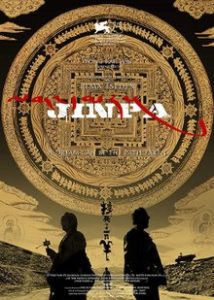 Jinpa: There is a quiet and poetic Eastern mysticism present throughout ‘Jinpa,’ which gives this incredibly straightforward story a lot going on for its duration and leaves a lot for the viewer’s sensory perception. The story is a man named Jinpa picks up another man named Jinpa in his truck to go into the next the town the catch being hitch hiker Jinpa plans on killing the man who killed his father. He is sincere and committed while Jinpa the driver does not believe he has the temperament to pull off such a bold move. The film takes placeat the Kekexili plateau in Tibet which might seem like a place so off the grid that it isn’t recognizable as Planet Earth and the simplicity of the plot allows for atmosphere of the setting to dominate the film. The locals wear clothing from another era and the actors themselves don’t look like they know how to be anything other than this which gives this film a magic that is never seen in a contemporary Hollywood film. The film is produced by Chinese filmmaker Won-Kar Wai who has made many films worth your time such as ‘Days of being Wild,’ ‘Chungking Express,’ & ‘In The Mood for Love,’ so it is no wonder that even films he produces possess magic that will never leave you once you have seen it for yourself.
Jinpa: There is a quiet and poetic Eastern mysticism present throughout ‘Jinpa,’ which gives this incredibly straightforward story a lot going on for its duration and leaves a lot for the viewer’s sensory perception. The story is a man named Jinpa picks up another man named Jinpa in his truck to go into the next the town the catch being hitch hiker Jinpa plans on killing the man who killed his father. He is sincere and committed while Jinpa the driver does not believe he has the temperament to pull off such a bold move. The film takes placeat the Kekexili plateau in Tibet which might seem like a place so off the grid that it isn’t recognizable as Planet Earth and the simplicity of the plot allows for atmosphere of the setting to dominate the film. The locals wear clothing from another era and the actors themselves don’t look like they know how to be anything other than this which gives this film a magic that is never seen in a contemporary Hollywood film. The film is produced by Chinese filmmaker Won-Kar Wai who has made many films worth your time such as ‘Days of being Wild,’ ‘Chungking Express,’ & ‘In The Mood for Love,’ so it is no wonder that even films he produces possess magic that will never leave you once you have seen it for yourself.
Han Dan: If a film can use a single visual as a metaphor for the theme of the film effectively then it’s already a pretty solid movie. The Taiwanese film ‘Han Dan,’ accomplishes this through the use of fireworks: it represents both chaos, sheer beauty and metaphorically it represents the relationship of two frenemies. Han Dan is a Taiwanese deity in where fire and punishment is a form of atonement and it is this spiritual element that enriches the story of a love triangle and drug addiction: it elevates it to make this trope work visually. The actors deliver nuanced performances in a drama that deal with the big emotional subjects such as love and lose in a transient life and it is that lapse of time improves the film as it allows for the showing of growth and regression. While acting style and maybe the music as well might not allow a newbie with Asian movies to fully appreciate the depth of this film those who have been watching them for a few years will see this as the strong dramatic work that is.
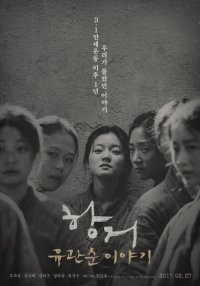 A Resistance: When I studied script-writing at Algonquin College an Instructor told me that when the story goes to prison the story is essentially done. This movie starts in prison and ends in prison – it’s as if the story-line is finished in the first frame. That’s not to say that good prison movies don’t exist there are plenty of them however this one isn’t particularly strong. The film takes place in 1919 Japanese occupied Seoul, Korea and looks at a year-long saga of a locked 17 year old resistance fighter in captivity. The film is shot in black and white which makes it reminiscent of ‘Schindler’s List,’ which makes the film unfortunately come across as derivative. The grievance narrative is justified but it also gets boring and stuffy especially for a non-Korean perhaps an olive branch approach to show some more humanity in the Japanese occupiers would have broken levity or made the drama more complex. The actors do what they can with the material but no one shines given the 2 dimensional script. Too bad!
A Resistance: When I studied script-writing at Algonquin College an Instructor told me that when the story goes to prison the story is essentially done. This movie starts in prison and ends in prison – it’s as if the story-line is finished in the first frame. That’s not to say that good prison movies don’t exist there are plenty of them however this one isn’t particularly strong. The film takes place in 1919 Japanese occupied Seoul, Korea and looks at a year-long saga of a locked 17 year old resistance fighter in captivity. The film is shot in black and white which makes it reminiscent of ‘Schindler’s List,’ which makes the film unfortunately come across as derivative. The grievance narrative is justified but it also gets boring and stuffy especially for a non-Korean perhaps an olive branch approach to show some more humanity in the Japanese occupiers would have broken levity or made the drama more complex. The actors do what they can with the material but no one shines given the 2 dimensional script. Too bad!
Han Dan: If a film can use a single visual as a metaphor for the theme of the film effectively then it’s already a pretty solid movie. The Taiwanese film ‘Han Dan,’ accomplishes this through the use of fireworks: it represents both chaos, sheer beauty and metaphorically it represents the relationship of two frenemies. Han Dan is a Taiwanese deity in where fire and punishment is a form of atonement and it is this spiritual element that enriches the story of a love triangle and drug addiction: it elevates it to make this trope work visually. The actors deliver nuanced performances in a drama that deal with the big emotional subjects such as love and lose in a transient life and it is that lapse of time improves the film as it allows for the showing of growth and regression. While acting style and maybe the music as well might not allow a newbie with Asian movies to fully appreciate the depth of this film those who have been watching them for a few years will see this as the strong dramatic work that is.
Wushu Orphan: This Chinese drama is very interesting work reminiscent of Luchino Visctoni’s ‘Death in Venice,’ in which an older man sees himself in a younger man reminding us that growing pains are constant throughout life. The setting is the 1990s in a martial arts school for orphans or abandoned kids with an emphasis on the physical over mental side of Kung Fu hence the idolization of Bruce Lee: the kids touch his face on a poster before they leave for class for the day. Enter the new teacher Lu Youhong who wants to emphasis intellect for these rough kids which seems laughable however he does connect with a student named Zhang Cuishan a child who we see try to escape the school in the first scene. There principal of the school is a typically stoic character but also the acting and writing mocks the archetype of the patriarchal figure which was fun as well, there is a love story and all in all this is just solid emotional content. It never gets too weepy or too apologetic for it’s an open style leading the end result to be a very good film that people at all stages of life will be able to identify with since no one ever feels totally comfortable whether they are and we all yearn to be accepted for our own virtues instead of what the group think suggests for us.
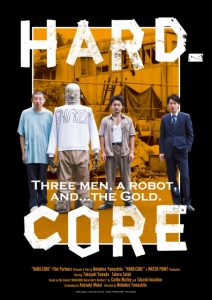 Hard-Core: Quirky is the name of the game in ‘Hard-Core,’ which is a comedy that could only come from Japan since it deals with 2 awkward loners who hang out with robot and are trying to find some lost gold from a Shogun. That synopsis could not be written for any other movie from a country other than Japan unless that country was remaking this or paying homage to Japan which makes this film zaniness charming and perhaps difficult to appreciate because of its regional flare. So if you have a Japanese sense of humor or can at least you can appreciate then this film is for you otherwise it’s a big skip because this film never slows down for you or explains itself which is kind of a beautiful thing. The eternal loneliness in a certain type of Japanese man is a constant in Japanese cinema because it is a constant in Japanese society so this film can be perceived as misogynistic since the principal characters don’t know anything about women other than they are attracted to them. There is a S&M scene and the Japanese are known for their wild depictions of sex for the didactic reason that they are a repressive society but if you can get beyond that maybe this film is for you. If you just want to take off with a robot buddy and don’t think depiction of gender relations is a deal breaker then this movie is totally fine for you!
Hard-Core: Quirky is the name of the game in ‘Hard-Core,’ which is a comedy that could only come from Japan since it deals with 2 awkward loners who hang out with robot and are trying to find some lost gold from a Shogun. That synopsis could not be written for any other movie from a country other than Japan unless that country was remaking this or paying homage to Japan which makes this film zaniness charming and perhaps difficult to appreciate because of its regional flare. So if you have a Japanese sense of humor or can at least you can appreciate then this film is for you otherwise it’s a big skip because this film never slows down for you or explains itself which is kind of a beautiful thing. The eternal loneliness in a certain type of Japanese man is a constant in Japanese cinema because it is a constant in Japanese society so this film can be perceived as misogynistic since the principal characters don’t know anything about women other than they are attracted to them. There is a S&M scene and the Japanese are known for their wild depictions of sex for the didactic reason that they are a repressive society but if you can get beyond that maybe this film is for you. If you just want to take off with a robot buddy and don’t think depiction of gender relations is a deal breaker then this movie is totally fine for you!
The Scoundrels: This high octane action bro fest is a decent Taiwanese film but perhaps is a lower tier shoot ‘em up even though there is a nice use of color but not much investment in character or story. The film does provide action but it is neither inspired nor very engaging if you isolated the fight scenes and wanted to impress someone simply with that which does not really work for a 105 minute experience. John Woo’s ‘The Killer,’ is a masterpiece not simply because of the distinguished choreography and visuals but because it is complimented with strong exaggerated personas who play off each other like they’re different instruments in a great band. It’s fine to want to see a mindless action but some inspired characters and a strong story-line within the context of the action is still necessary, mindless entertainment needs some subtle arrangement in the script maybe more than any other genre. Seeing a basketball player fall from grace and go gully to then survive in the end just did not cut for this film critic as an action film that deserves recommendation and the use of his love interest was especially worthless. The love interest though serves as a healthy metaphor for this entire experience: no chemistry!
If You Are Happy: This is a legitimately excellent drama that plays out like a tight Hitchcock thriller while exposing actual economic and social justice in China so if you’re looking for something totally adult, totally thrilling in a real life sort of way then this movie is for you! The film tells the story of Professor Fu bribing and pulling all kinds of shade to get rid of his house to get in the zone that ensures that his daughter gets the best future possible because the zone you live in determines the school you can go to. It’s a sad reality that what you are born with will largely determine your outcome in life contradicting the notion that capitalist freedom allows for social mobility and if you work really hard your dreams are attainable. What’s excellent about this film is it is a realistic drama but is never boring and still follows the ticking clock thriller formula because Professor Fu only has so much time to get everything lined up so the tension is palpable throughout. The fact that people look like real people and aren’t all dolled up adds to the realistic atmosphere and to see Professor Fu who starts with only good intentions be revealed to be a degenerate was fun to see. The scariest thing about this movie is that it is based on a true story and the Communist critique on modern Chinese society does pack a lot of punch there are even testimonials from real people during the end credits!
Walk With Me: The number of people you can you trust in the world of an atmospheric yet still jump scare horror movie is not going to be very much as is shown in this Malaysian horror movie where the aesthetic is both high and low. The film is in the tradition of Val Lewton in that atmosphere and feeling are there but there are also abrupt cuts to something horrific which makes it like a 90s camp horror film and the end result is a strong mixed bag. The horror really boils down to the issue of trust as all human relations become up for grab gradually but surely once visions of terror get in the mix it effects everyone around the female protagonist played by Emily Kwan. The film is standard in a sense but compared to 2018’s ‘May the Devil Take You,’ from Indonesia it is a superior film with its pacing in the script which is gradual but rarely boring and effects which are pretty strong. The sense of paranoia and downfall is ever present so the real life fears it taps into are good but it is in the visuals from time to time that weaken what is strong about the movie which is the expression of not being able to trust anyone.
Rib: This film looks at a Transgender Woman living in China and the acceptance she needs from her Christian father in order to get his signature to get the operation she needs to avoid depression and even worse. Instead of this film antagonizing those who believe in Christianity it has a beautiful message of reconciliation and acceptance for those who differ in the belief of gender being fluid instead of rigid. The transgender community in China face disrespect by leaving the door to walk in the world but the idea of maintaining grace and dignity despite the possibility of being murdered because of your identity is extremely powerful and works so well for a drama. The stakes are so real and the use of black and white works metaphorically in this contemporary debate where we are either for or against on this topic instead of trying to empathize and understand the other perspective. If this film does not move you by the end then perhaps you are too rigid against the Trans community but the filmmakers love you anyways since this film is way more open and at peace with humanity than you may assume it is.
previous 9…..
Master Z: IP Man Legacy: if you are a fan of martial arts cinema of Bruce Lee you need to see the Ip Man movies that are based on the life of the man who trained Bruce Lee. The first film is a classic of the 2000s. Ip Man 2 & 3 build the world with memorable performances from Sammo Hung & Mike Tyson. Actor Jin Zhang is in Ip Man 3 as Cheung Tin-chi a challenger to Ip Man to be the Master of the Wing Chung Kung Fu. While Cheung Tin-chi fails to defeat Ip Man in Ip Man 3 he is certainly worthy of his own spin off story seen in Master Z: IP Man Legacy. The film builds and does not diminish the world that started over 10 years ago in the first Ip Man film. The film is somewhat standard for a martial arts film and that is totally fine – it delivers the good. It is directed by Yuen Woo-Ping who recently directed ‘Crouching Tiger, Hidden Dragon 2: Sword of Destiny’ (2016) but did fight choreography from ‘The Matrix,’ & ‘Kill Bill,’ films! Yuen Woo-Ping will be receiving the Star Asia Lifetime Achievement Award this summer at the New York Asia Film Festival and Master Z is proof that no one deserves it more!
Samurai Marathon: Can samurai movies be hang out movies? Yes, they can! The palace intrigue story about the end of the Japanese isolation era with Americans coming to do state business takes place with an interesting cast of characters and a good mix of hilarity. Running away from everyone and everything seems appropriate in this light hearted take on Japan in 1855. It’s an entertaining film by British Director Bernard Rose and even has a score by Candyman composer Phillip Glass. My one complaint is it’s pretty middle of the road despite being competently shot and acted. The story won’t stay with you at all really.
 Zombiepura: This Zombie comedy from Singapore is as if Edgar Wright made ‘Shaun of the Dead,’ in Singapore but went for ‘Day of the Dead,’ in a comedic way! The film has no big missteps and does a run of the mill trying to contain a zombie apocalypse in a military base before it spreads but in a comedic way. The writer & director Jacen Tan clearly respects and likes the material he is working with and it is always good to have a sense that the creators are having fun. With ‘One Cut of the Dead,’ which screened at the last New York Asian Film Festival & of course ‘Train to Busan,’ it’s great that Asians are getting their own sub-genre within the Zombie film as of late. ‘Zombiepura,’ rarely lags in action or wide eyed panic & it should satisfy your hunger for flesh or at least this take on the genre.
Zombiepura: This Zombie comedy from Singapore is as if Edgar Wright made ‘Shaun of the Dead,’ in Singapore but went for ‘Day of the Dead,’ in a comedic way! The film has no big missteps and does a run of the mill trying to contain a zombie apocalypse in a military base before it spreads but in a comedic way. The writer & director Jacen Tan clearly respects and likes the material he is working with and it is always good to have a sense that the creators are having fun. With ‘One Cut of the Dead,’ which screened at the last New York Asian Film Festival & of course ‘Train to Busan,’ it’s great that Asians are getting their own sub-genre within the Zombie film as of late. ‘Zombiepura,’ rarely lags in action or wide eyed panic & it should satisfy your hunger for flesh or at least this take on the genre.
It’s a Mad, Mad, Mad Show: This is proof that Chinese comedies can be pure gold. I love that the screwball comedy style never seemed to die in China & this contemporary take on how we consume media partially justifies the old style of humour. As someone who works in community radio in Ontario which may be done in a matter of months it resonants with how far one will go to keep content exciting. It means devoting your whole life to your content & essentially a bitter fight to the end. The gig economy is applicable to media & frankly no one knows anything as to what is steady money these days. The fact that this content comes from China is amusing given the censorship in that country. It is interesting to see the rise & steady suppression of individual icolonclasts on the internet by old media told by the Chinese. The specificity of show business will not disqualify you from watching this it is the manner of the comedy. But if you like zany, well, this is certainly that!
The Gun: This Japanese youth movie might prove to be very intriguing to you. It is shot in black and white and looks at the curiosity attached to a gun and the possibility of violence. Our protagonist Toru is drifting through his post-secondary experience & this possibility for destruction through meaning or possibly without occupies his mind throughout. The use of black and white in any contemporary movie is a curious aesthetic. I believe it works in this case to show an emotionally fatalistic, slow paced & deliberate film. To want to inflict pain out of randomness isn’t what it seems: it is simply a lack of direction & youthful angst that sometimes consumes us. The metaphor of sex as a form of violence manifested by the possession of the gun was the strongest part of this film. It’s an economically effective movie that is worth your time!
Dare to Stop Us: It’s the ‘Boogie Nights,’ story from Japan! Wakamatsu Koji has an auteur vision for Japanese cinema but can’t fill a theatre. This story of his soft core porn film-making is charming & full of charisma. However: why do period movies look like their filmed today? It is a current trend that is not a good one. The story does also lose energy and fizzle our near the end of its 2 hour running time. The fact that this filmmaker has a bio pic is wonderful though & the spunky, counter culture turned mainstream story line is cute. If a Meiko Kaji bio pic comes out because of this it’ll have been totally justified! Otherwise it’s solid but the content does not match the ambition of the concept of this story.
Furie: While the Philippines has ‘BuyBust,’ & Indonesia has ‘The Raid,’ Vietnam is trying to cash in similarity with their film ‘Furie.’ While all 3 films are fun, insane & implausible ‘Furie,’ is just not as good as the previous 2 films. Veronica Ngo of ‘Star Wars: The Last Jedi,’ fame stars as Hai Phuong who extorts people until one day the changing tides of the criminal underworld turn against her. Her daughter gets kidnapped & she runs around trying to get her back. Simplicity is necessary for this kind of movie but the acting isn’t as strong as they should be. A fun romp equals good cinema but this just isn’t a particularly fun one. The exaggerated lighting is the best thing going on in this film while the choreography is competent but without much heart.
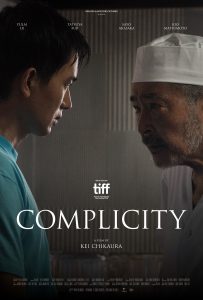 Complicity: The issue of immigration dominates the news cycle but before it was trendy Japan has always maintained strict immigration policies. You can work in Japan but if you’re not Japanese immigration is virtually impossible. This hard line stance is not taken in the story of ‘Complicity,’ in which a Chinese man illegally immigrates to Japan and gets a job making traditional Japanese soba noodles. When the Chinese man’s employer finds out he freaks out because of possible trouble he could face with the police but then everyone relaxes since Chinese or not the young man is a part of the family. In the era of the Donald Trump Presidency it is a temporary relief to see this story particularly coming from Japan a country which is often accused of being insular and unfriendly to the rest of the world. It is so important to distinguish between the people and public policy and cinema is a great bridge to do that.
Complicity: The issue of immigration dominates the news cycle but before it was trendy Japan has always maintained strict immigration policies. You can work in Japan but if you’re not Japanese immigration is virtually impossible. This hard line stance is not taken in the story of ‘Complicity,’ in which a Chinese man illegally immigrates to Japan and gets a job making traditional Japanese soba noodles. When the Chinese man’s employer finds out he freaks out because of possible trouble he could face with the police but then everyone relaxes since Chinese or not the young man is a part of the family. In the era of the Donald Trump Presidency it is a temporary relief to see this story particularly coming from Japan a country which is often accused of being insular and unfriendly to the rest of the world. It is so important to distinguish between the people and public policy and cinema is a great bridge to do that.
The Fable: While ‘The Fable,’ is certainly reminiscent of the zany work of Takashi Miike’s work it is also reminiscent of ‘Branded to Kill.’ In ‘Branded to Kill,’ every assassin is given a number in a criminal hierarchy. In ‘The Fable,’ clearly the titular character is the #1! He runs around with his sister who lures people in with her sexuality. Fable clearly has no competition in his field whatsoever. Then the ‘Big Boss’ forces Fable to lay low because that’s what normal people do. Fable hangs out – with some difficulty – but how long is that supposed to last? To criticize this film from a realistic or logical standpoint is no fun. It’s not trying to be anything other than aesthetic and it achieves that B Grade Takashi Miike style that it is clearly going for.

